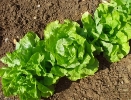Scientists from the U.S. Geological Survey will embark on a research cruise to the Arctic Ocean beginning today to collect water samples and other data to determine trends in ocean acidification from the least explored ocean in the world.
The study, say the authors, will help to conserve some of the world’s most important coral reefs by identifying reef systems where biodiversity is high and stress is low, ecosystems where management has the best chance of success.
High concentrations of phosphorus in aquatic ecosystems are often associated with human activities in the surrounding area, such as agriculture and urban development.
The playground at Bristol Park in Turlock, Calif., is roughly 20 years old, in major need of a facelift and some TLC.
Under the terms of a settlement lodged in federal court, the City of Newport has agreed to eliminate illegal discharges of sewage into Narragansett Bay from its wastewater treatment plant and wastewater collection system.
Farmers in the Everglades Agricultural Area (EAA), south of Lake Okeechobee, achieved a record-setting 79 percent phosphorus reduction in the water leaving the farming region -- more than three times less phosphorus than the state requirement.
There are many different types of plants in grasslands around the world. According to a new analysis of plants in grassland ecosystems around the world, it turns out that most of those plant species are important.
The Ohio State researchers argue that in this case, as forests age, they get rejuvenated with younger individuals of different species – a more-complex and -diverse community will be replacing the old guard.
A team of scientists just discovered a new eruption of Axial Seamount, an undersea volcano located about 250 miles off the Oregon coast – and one of the most active and intensely studied seamounts in the world.
Hunters have been credited with being strong conservation advocates for numerous game species in multiple countries. Would initiating a wolf hunt invoke the same advocacy for the carnivores?
The University of Denver (DU) Sturm College of Law Environmental Law Clinic filed a federal lawsuit aiming to protect the porbeagle shark from overfishing that has pushed the species to the brink of extinction and left it in need of federal protection, the students say.

New Zealand’s intense ultraviolet light may be bad for the skin, but it could provide a boost for vegetable production, according to new research by a Massey University crop scientist.
Dog-sized dinosaurs that lived near the South Pole, sometimes in the dark for months at a time, had bone tissue very similar to dinosaurs that lived everywhere on the planet, according to a doctoral candidate at Montana State University (MSU).
The reefs, which provide habitat for popular sport fish and other marine life, pulled more than $253 million into the region during one year, the study found. Though it costs nothing more than a saltwater fishing license to use the submerged structures as a fishing spot, anglers spend money on food, lodging, fuel, tackle and other necessities.
New research published in the journal Biogeosciences provides a detailed account of how carbon naturally flows into and out of crops themselves as they grow, are harvested and are then eaten far from where they're grown. The paper shows how regions that depend on others to grow their food end up releasing the carbon that comes with those crops into the atmosphere.
Changes in ocean chemistry due to increased carbon dioxide (CO2) emissions are expected to damage shellfish populations around the world, but some nations will feel the impacts much sooner and more intensely than others, according to a study by scientists at Woods Hole Oceanographic Institution (WHOI, USA).
Ensuring that a population of fish is breeding naturally within their holding pens is a sustainable fish farming goal.
Writing in the journal Annals of Botany, Professor Douglas Kell argues that developing crops that produce roots more deeply in the ground could harvest more carbon from the air, and make crops more drought resistant, while dramatically reducing carbon levels.
Coccolithophores, a certain group of algae, form thinner calcite skeletons when the pH value in the ocean drops. In marine ecosystems, changes in the degree of calcification are much more pronounced than presumed to date based on laboratory tests. These changes have an impact on the global carbon balance since the examined microalgae influence the carbon dioxide exchange between ocean and atmosphere.
This practice of sampling and analyzing tissue from trees and other plants to determine the presence of contaminants in soil and groundwater holds promise because it gives engineers a quick, accurate and inexpensive way to measure the extent of environmental pollutants without having to dig into the ground.